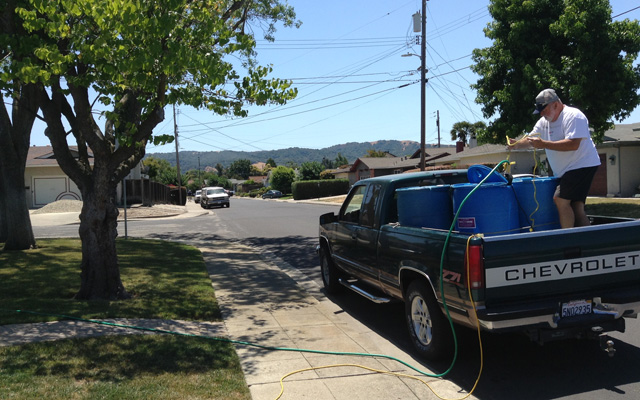He said one of the biggest hurdles is the “yuck factor.”
Because, you know, the water starts in the sewage treatment plant. But it gets an extra filter through sand, a blast of ultraviolet light and a final dose of bleach.
“Basically, there is less bacteria than lake water that you swim in, and it has no smell to it,” Darren Steel said. “And it’s great for the plants.”
Steel said he comes regularly for water to keep his back lawn alive.
Retired school administrator Irene Martin was filling up big plastic painters' buckets at the pump next to Steel.
“Even an old woman can do it,” she said, laughing, hose in hand. “I handle these five-gallon buckets just fine. And my front garden is looking wonderful. … Because of the poop water.”
Steel and Martin are just two of the 290 people who have registered with the district to fill their containers at the station. Some bring old kitty litter jugs. Others haul old balsamic vinegar shipping vats that carry 275 gallons, found on Craigslist.
Joellen Kleier and her husband have a different system: five huge blue plastic barrels in the back of their full-size pickup. Kleier said they bought the barrels for around $100.
“And then the pump was $75, but it’s well worth it,” she said. “We’ve used more than $200 worth of water.”
And their lawn is getting green again, which can inspire “drought rage” from neighbors who think they’re using potable water.
“I had a man today, in fact, drive down the street, shake his finger at me and yell ‘you can’t water in the daylight,’” Kleier said. “I said, ‘wastewater, it’s all right.’ He did a very obscene gesture and kept driving.”
The district has a sign for that. It says: “Recycled water keeps this garden green. Recycled water saves drinking water.”
The Kleiers have a system at their 1960s ranch house to get their hauled recycled water to the plants. Dan Kleier simply climbs into his truck bed with a pump, connected to a hose. He plugs the pump in and dunks the submergible bilge pump into one of the buckets.
His wife works the hose with the hand-held sprinkler attachment. She sprays the flowers and then switches over to a stationary sprinkler head that waters the lawn.
They said it’s a lot of effort, but it’s worth it to keep the plants alive.
Still, using recycled water on landscaping is rare even in this water district.
In Southern California, recycling water is more common. UC Berkeley professor David Sedlak, co-director of the Berkeley Water Center and director of the Institute for Environmental Science and Engineering, said many new developments in the southern part of the state have so-called “dual piping.” That allows for tap water inside the home and recycled water outside for irrigation.
Sedlak said retrofitting some existing water systems is on the horizon.
“We will have projects where pipes will be brought into a neighborhood and people will have choice: Do you want to use recycled water or continue using drinking water on your lawn?” he asked.
The Dublin experience is a great way for people to get their feet wet, so to speak. Once people have this experience with recycled water, Sedlak said, they’re more likely to say yes to proposed projects.
The Dublin San Ramon Services District’s Fuller said they now recycle half of their water during a typical summer day -- it’s less in the winters. But they’d like to be the first utility in the nation to get to 100 percent reuse.
“Is the best use of it to dump it into San Francisco Bay?” Fuller asked. “Or is the best use of it to give it a little bit further treatment and use it for irrigation and maybe even use it to supplement the drinking water supply one day?”
That’s right, supplement the drinking water supply. Sedlak said it will need to happen in parts of the state if California is to meet its aggressive goal of using one-third recycled water by the year 2030.
While that may be far off, Fuller said he’s hearing from other water districts about their interest in replicating the free, recycled water station right now.
Get those buckets ready.
